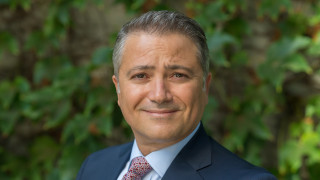Why They Kill Featured in Milwaukee News
Monday, August 15, 2022

Giuseppe Fazari, Ph.D.
The award-winning documentary, Why They Kill, written and directed by Professor Giuseppe M. Fazari of the Department of Criminal Justice, was recently screened at Marquette University by Wisconsin Community Services and Scaling Wellness In Milwaukee, or SWIM, a nonprofit organization dedicated to “collaboration that helps to prevent and respond to trauma and creates a resilient Milwaukee.”
The screening was part of “a community discussion on how childhood trauma could potentially be a link to violence down the line,” according to WTMJ-4 TV, the Milwaukee NBC affiliate. WTMJ featured the screening in an article entitled “'Why They Kill': Discussion, screening addresses how childhood trauma is connected to violence,” as well as a televised news story.
Fazari has traveled across the country via a series of invitations to screen and discuss the film. Prior to the screening at Marquette, the film was featured and discussed at the U.S. Naval War College, for the cadets and faculty at West Point, at the World Bank in Washington D.C. as a part of their Global Solutions Group Stability, Peace and Security Lecture Series, and at the annual conference of the National Association for Court Management in Las Vegas, Nevada, where Fazari discussed the "phantom community" construct in the film vis-à-vis the court's role and responsibilities in sentencing defendants.
Why They Kill is based on the critically acclaimed book of the same name written by Pulitzer Prize-winning author Richard Rhodes. The book was based on the research of Seton Hall Criminal Justice Professor Lonnie H. Athens.
The documentary takes an in-depth look at why some men, women, and even children assault, batter, rape, mutilate, and murder through the lens of Professor Athens' breakthrough research and singular theory which the New York Times noted, "offers a commanding perspective on human violence."
Known as the "Violentization Theory," Athens' work uses his interviews with killers as a basis to explain how violent criminals develop, how violent communities are created and transformed, and how violent acts are committed and prevented.
The theory is fleshed out within the documentary through a series of case study dramatizations depicting the stream of consciousness of some of the country's most violent criminals, the homicide detectives who pursue them and the lawyers charged with their prosecution.
In Milwaukee, after the screening District Attorney John Chisholm, Police Chief Jeffrey Norman, activist Torre Johnson and Professor Fazari, all weighed in, as did members of the community.
The conversation focused on practical responses available to the community – informed by the film and its theories – to create a working model for crime and violence reduction in Milwaukee.
“I am pleased with the continued, positive reception that the our audiences are having for Athens’s groundbreaking work depicted in the film. And perhaps most rewarding from the numerous screenings we have had is that each group seems to have taken away something distinctly different – and, I’m told, useful,” said Professor Fazari. “The World Bank, for instance, looked at the film through the lens that accounts for the economic impact of violent crime; court officials carefully considered the implications of Dr. Athens’s violentization theory and phantom community concept in considering the court’s role and responsibilities in sentencing defendants. At the U.S. Naval War College and West Point the focus was more on understanding violence from the perspective of leadership and the military’s organizational response. Most recently, in Milwaukee, the discussion centered on community interventions to stem the cycle of violence and the wreckage it leaves behind. In general, I am happy that the film is working as a springboard to having these difficult, but important, conversations.”
View the NBC TV News story here.
Categories: Arts and Culture






